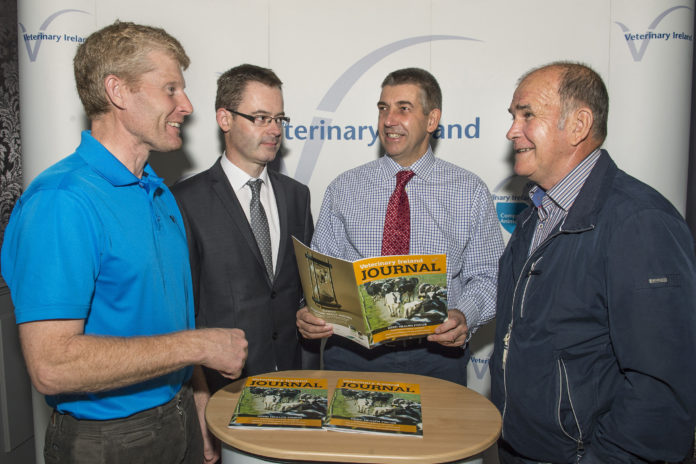
The Cattle Association of Veterinary Ireland (CAVI) 2017 Annual Conference opened in the Rochestown Park Hotel on Friday, October 13th where it ran until the 15th and was attended by over 150 of Ireland’s most progressive farm vets.
The conference programme delivered high quality professional development for vets working in farm animal medicine, who are working with the Irish agri food sector and keen to continuously upskill. As our largest indigenous industry, agriculture remains one of the foundations of Ireland’s continued economic revival.
Veterinary delegates heard insights and perspectives from veterinary practices in important markets such as the Middle East and Denmark – from international speakers as well as Irish veterinary experts who have operated in those regions.
FARMER PERSPECTIVE
Local farmer Dick O’Neill, milking 260 cows at Warren Farm in Co. Cork as part of a milk production partnership, described how he now considers veterinary spend as an investment in health, rather than paying for disease management; and demonstrated how a proactive herd health management approach developed with his vet has paid dividends on his farm over the last decade.

THE CHANGING ROLE OF IRISH VETS
Delegates heard how the role of the vet has changed from prescribing medicine and being a ‘fireman’ – to a highly professional consulting business.
The changing role of vets in Ireland was explored by Jerry Crowley based in Killeagh on the Cork/Waterford border, who agreed that the traditional role of predecessors of providing ‘ambulatory’ services has changed significantly and raised the challenge of continuing to attract the right people in to the sector.
Case studies presented ranged from an Irish vet – Conor Beirne – practicing in Mountbellew while continuing to work on dairy projects in Saudi Arabia and Jordan. He quoted the example of Almarai in Saudi Arabia which owns a herd of 90,000 Holstein dairy cows across 6 super farms.
“There are no private veterinary practices in this part of the world and veterinarians tend to be employed by the individual companies themselves or the state. Vets on these farms spend much of their time collecting data and monitoring targets set for herd performance,” said Conor Beirne. “Management of cows on such a scale requires military style attention to detail and the vet plays a critical role in the operation.”
LAME COWS CAN LOSE 400L OF MILK
The average lame cow loses around 400 litres of milk (570 litres for a sole ulcer, and 370 litres for white line abscess) – according to Roger Blowey. International expert Roger Blowey from the UK has spent over 40 years involved with farm animal medicine in Gloucester and Weybridge, specialising in lameness and mastitis in dairy cattle, and a range of health issues in pigs.
Issues can be caused by weight-bearing and over-growth but also by general management issues on farm factors including feeding and body weight changes. Roger Blowey gave the example of calving time, when horn growth slows down and almost stops, but the rate of wear increases.
Excess standing also causes problems. Cows stand to be milked, stand to feed, stand to drink and stand for social interactions. The high-yielding cow has to stand to eat for some 6-8 hours per day and longer than this will be required if there is inadequate feed space (i.e. less than 2 feet per cow).
INDUSTRY & VETERINARY SPECIALISTS
Industry speakers include Gabriel Beechinor (Director of Veterinary Sciences of the Health Products Regulatory Authority, previously the Irish Medicines Board) with a European Legislation update on the Medicines Directive. Finola McCoy (Programme Manager, CellCheck) provided an update on CellCheck; whilst updates on Beef Health Check on BVD were shared by David Graham (Animal Health Ireland). Luke O’Grady, (Lecturer with the unit of Herd & Veterinary Public Health, UCD) joined the session delivering case reports on mastitis.
Eoin Ryan (Lecturer in Farm Animal Clinical Studies, UCD) spoke about orthopedics and surgery; and Doreen Corridan (Munster Cattle Breeding Group) gave insights in to Optimising Suckler Cow Fertility. Liz Lane and Niamh Ryan (Supervising Veterinary Inspectors with the Department of Agricultural, Food and the Marine) spoke about calf health, fertility and teat sealing heifers.
The Mayor of County Cork, Cllr Declan Hurley attended the CAVI Conference on Saturday morning, 14th October, to address delegates and meet with expert speakers and delegates.
Thanks were expressed to the CAVI Conference organizing committee for 2017 including Irish vets Conor Geraghty (Chair), Donal Lynch, John O’Rourke, David Graham, Ciaran Mellet, Donal Murphy, John Gilmore, Doreen Corridan, Liz Lane and Kevin O’Sullivan.







